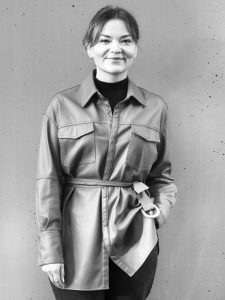Beate Piela

Shortbio
- seit 2022 Wissenschaftliche Mitarbeiterin, DFG-Graduiertenkolleg 2227 »Identität und Erbe«, TU Berlin
- 2019-2022 Freie Wirtschaft
- 2015-2019 Kunstgeschichtestudium mit dem Schwerpunkt „Kunstvermittlung in Museum und Kunsthandel“; Heinrich-Heine-Universität Düsseldorf, Thema der Masterarbeit: „Polen heute. Zeitgenössische Kunst im Kontext des Politischen“
- 2018 Forschungsaufenthalt in Krakau (Polen), finanziert durch das PROMOS-Stipendium (DAAD)
- 2015-2018 Wissenschaftliche Hilfskraft für die Forschungsdatenbank „Art Research & Internationale KünstlerInnen- und Ausstellungsdatenbank“, 2018 Leitung des Forschungsprojekts
- 2012-2015 Bachelorstudium Kunstgeschichte (Ergänzungsfach Germanistik), Heinrich-Heine-Universität Düsseldorf; Thema der Bachelorarbeit „Raum bei Katharina Grosse“
- 2012-2015 diverse Praktika in Köln, Solingen und Düsseldorf
- 2010-2012 Bachelorstudium Germanistik und Philosophie
The Resistant in Art as the Political in Post-Socialist Poland
Starting from the ongoing right-conservative backlash in Poland—particularly during the rule of the Law and Justice Party (Prawo i Sprawiedliwość, PiS) from 2015 to 2023—and the accompanying high-profile protests, such as the so-called Black Protests, during which the feminist work Invisible Women of Solidarity (2009) by artist Sanja Iveković was reproduced on banners, this dissertation examines the relationship between art and politics in correlation with the construction of “national identity” in Poland.
The focus lies on the period from 1989 to the present—thus encompassing the phase of post-socialist transformation in which not only new political and economic structures emerged, but also ideological tensions that ultimately culminated in the right-conservative shift.
While the project operates with a redefined spectrum of concepts of resistance—such as weak resistance(Ewa Majewska)—this conceptual reframing serves as a methodological approach to make the political in art visible. The notion of the resistant thus functions as a central analytical category. Against the backdrop of a global conservative and authoritarian turn, the study explores the levels on which the political becomes articulated and manifest in art.
The analysis is based on a threefold methodological approach that stems from the observation that the political often takes shape already at “pre-artistic” levels. First, art is examined within its art-historical framework—drawing on, among others, postcolonial and decolonial perspectives that challenge the universalist claims of Western art history and the marginalization of (semi-)peripheral narratives. Art history itself is revealed as an ideologically charged system of knowledge which—like museums or collections—is not neutral, but shaped by powerful structures. Second, institutions are examined as politically contested sites of negotiation—particularly in relation to cultural policy and the notion of “national identity.” Third, resistant artworks and so-called postartistic practices (Jerzy Ludwiński) are analyzed, which operate at the intersection of art and activism, occupy public space, and articulate concrete political concerns. Resistant art is often seen as aligned with democratic aspirations—but in light of authoritarian and populist shifts, the question arises of whether and how art can meaningfully contribute to democratic processes.
This study thus contributes to a deeper understanding of the complex dynamics between art, politics, and the construction of national identity in post-socialist Poland, and offers impulses for the analysis and practice of political art in times of societal upheaval.
Publications
„Make Art, Make Resistance“
Sāo Paulo School of Advanced Science, Brasilien
Summer School Memory & Reparations (erscheint voraussichtlich Nov. 2025)
„Kunst in Polen: Vom Körper als Spiegel politischer Macht zu ›Verkörpertheit‹ und Protest“
Publikation des Graduiertenkollegs „Identität und Erbe“ (erscheint voraussichtlich September 2025)
Lectures
“Poland: Art History as a Critical and Crucial Practice in University and Science”
Sāo Paulo School of Advanced Science, Brasilien
Summer School Memory & Reparations, 2025
„Widerstand im Umbruch. Kunst in Polen zwischen Transformation und ›guter Wandel‹
IX. Internationales Doktorand*innenforum Kunstgeschichte des östlichen Europa, Humboldt-Universität Berlin, 2025
“Verkörpertheit der Kunst in Polen”
8. Jahrestagung des Graduiertenkollegs „Identität und Erbe“, Berlin 2024
„Polish Art in the Context of Transformation. National Identity between 1989 and the so-called >>Good Change<<”
Leibniz-Institut für Geschichte und Kultur des östlichen Europa (GWZO) e.V., 2024
„Kunst im Umbruch: Polen 1989 und heute“
6. Polenkongress Dresden, 2024
„Kunst in Grenzen“
Stiftung Gerhart-Hauptmann-Haus, Deutsch-osteuropäisches Forum, 2020